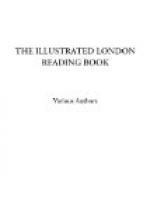After short show’rs; and sweet the coming on
Of grateful evening mild—then silent night,
With this her solemn bird, and this fair moon,
And these the gems of heav’n, her starry train:
But neither breath of morn, when she ascends
With charm of earliest birds; nor rising sun
On this delightful land; nor herb, fruit, flower
Glistering with dew, nor fragrance after showers,
Nor grateful evening mild; nor silent night,
With this her solemn bird; nor walk by moon
Or glitt’ring starlight, without thee is sweet.”—
Thus talking, hand in hand
alone they pass’d
On to their blissful bower.
Thus at their shady lodge
arrived, both stood,
Both turn’d, and under
open sky adored
The God that made both sky,
air, earth, and heaven,
Which they beheld, the moon’s
resplendent globe,
And starry pole. “Thou
also madest the night,
Maker Omnipotent! and Thou
the day,
Which we, in our appointed
work employ’d,
Have finish’d; happy
in our mutual help
And mutual love, the crown
of all our bliss
Ordain’d by thee, and
this delicious place,
For us too large, where thy
abundance wants
Partakers, and uncropt, falls
to the ground.
But Thou hast promised from
us two a race
To fill the earth, who shall
with us extol
Thy goodness infinite, both
when we wake,
And when we seek, as now,
thy gift of sleep.”
MILTON.
* * * * *
OLIVER GOLDSMITH.
[Illustration: Letter G.]
Goldsmith’s poetry enjoys a calm and steady popularity. It inspires us, indeed, with no admiration of daring design or of fertile invention; but it presents within its narrow limits a distinct and unbroken view of poetical delightfulness. His descriptions and sentiments have the pure zest of nature. He is refined without false delicacy, and correct without insipidity. Perhaps there is an intellectual composure in his manner, which may, in some passages, be said to approach to the reserved and prosaic; but he unbends from this graver strain of reflection to tenderness, and even to playfulness, with an ease and grace almost exclusively his own; and connects extensive views of the happiness and interests of society with pictures of life that touch the heart by their familiarity. He is no disciple of the gaunt and famished school of simplicity. He uses the ornaments which must always distinguish true poetry from prose; and when he adopts colloquial plainness, it is with the utmost skill to avoid a vulgar humility. There is more of this sustained simplicity, of this chaste economy and choice of words, in Goldsmith than in any other modern poet, or, perhaps, than would be attainable or desirable as a standard for every writer of rhyme.




